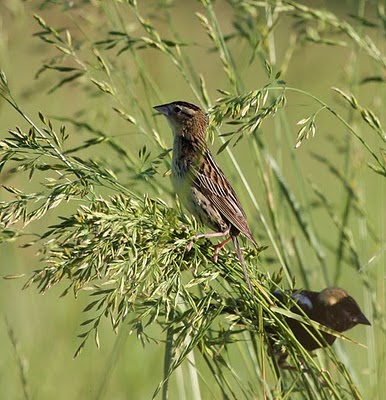
Male bobolink nesting in the meadow on the east edge of Cherry Lake.
This week a friend, Joe Kotlar, came across a disturbing editorial written in a farm publication from Ontario, Farmer's Forum, which claims to be "Ontario's Leading Farm Newspaper". The editorial is entitled, "Latest threat to farming — bobolink and biodiversity zealots"
Click on the link above and give it a read, but don't assume that this kind of embattled thinking represents all of rural Canada. Farmers are as diverse a bunch as any other group of human beings. While some enjoy having birds like the bobolink on their hayfields, and will consider taking measures to protect them, there are, unfortunately, those who see any wild animals on their land as a potential threat to their bottom line. It's this vocal group who often succeed in talking legislators into things like coyote and wolf bounties; who oppose any designation of an endangered species and who live in fear of some government employee telling them what they can or cannot do with their land. Between the extremes of farmers who have found a way to make a living by working with nature and those who see themselves in a pitched battle against the wild, there are those who are aware that their land is providing carbon sequestration, biodiversity, water filtration and other "ecological goods and services" (EG&S) that benefit the wider human and natural communities.
And at the same time, they know that these EG&S do not contribute to their short term bottom line and in fact they can make more revenue if they opt for farming practices that reduce habitat, pollute waterways, and increase their carbon footprint. From there it is not far to the assumption that they should be paid or compensated somehow for not choosing to degrade the EG&S their land contributes. This logic will sometimes lead farmers to say things like, "we are providing these EG&S and we should be paid for them."
That has a "truthy" ring, as Stephen Colbert would say, but of course we all know the real truth here: i.e. that it is not farmers but the biosphere itself that is providing the life-sustaining systems we depend upon. Farmers are not entitled to hold the commonwealth of clean air, water, and biodiversity ransom, but neither are the rest of us entitled to the cheap food that industrial agriculture ensures. A cattleman who keeps his land healthy and provides habitat will have higher production costs than those who push their land to minimize costs and maximize revenue. That reality means that today healthier food from healthier land is a luxury that only the wealthy can afford.
But what if there was a way we could agree that EG&S are a collective commons we must all take responsibility for? We would then all begin to share more of the embodied costs of protecting wildness on our farm landscapes, but even more important, we would begin to find regulatory instruments and disincentives that would increase the costs for anyone--farmers, industrialists of any kind, developers--who wants to drain a wetland, bulldoze a poplar bluff, or cultivate native grassland.

preening bobolink
As things stand, we have a cheap food policy that drives our over-heated economies and unsustainable development, and it has fostered a kind of agriculture that pre-selects for farmers who see the bobolink and any creature not increasing yields as an enemy. We all need to help turn this around so that it becomes possible once again for farmers to love the bobolink.

Female and male Bobolink together





You tell 'em, Trevor.
ReplyDeleteI am so disheartened by the sight of bulldozed trees at the edges of farmers' fields so they can get a few more feet of arable land.
Excellent post, Trevor. To echo Katie May, it is very disheartening to see sloughs being drained, trees bulldozed, even the ditches down here are filled in and farmed right up to the roadside in most of the back road areas. Birds? Doesn't seem as if any one cares except a few of us weird birder types. Eco-systems and environment - bad, nasty words. Have we always been this stupid?
ReplyDeleteThanks Katie May and Kathy. It's always good to know I am not alone thinking about these things.
ReplyDeleteHello Trevor,
ReplyDeleteI couldn't agree with you more that there needs to be a shift in our paradigms regarding EG&S. Low cost food is killing the ecosystem and no one is being held responsible. Unfortunately, the prospects of turning this tide in the other direction are meager. If only there were a way to make people understand the principles at play on a visceral level perhaps we could save our vanishing wildlands and wildlife. I just re-read your book "Grass, sky, song." and find it an inspiration that perhaps we can make a difference if only a little at a time.
Wil Hershberger
Thanks for the thoughtful comment, Will.
ReplyDeleteTrevor H